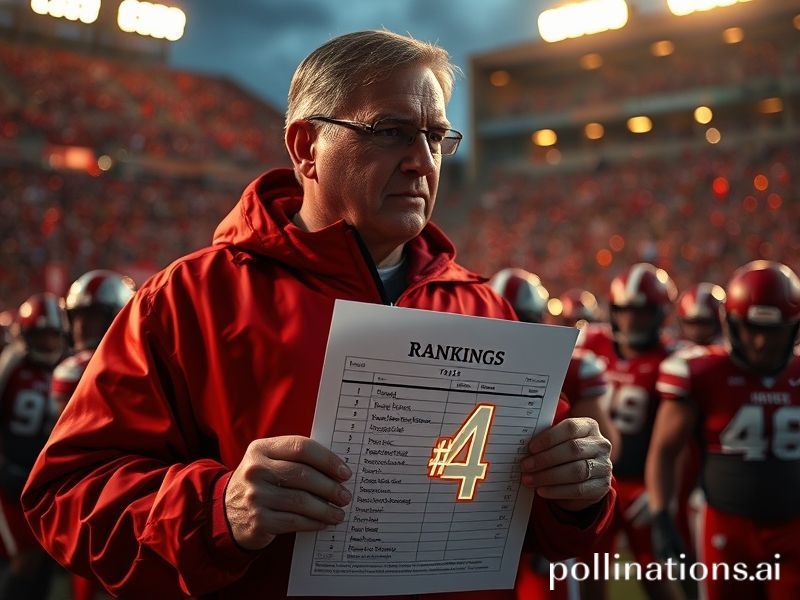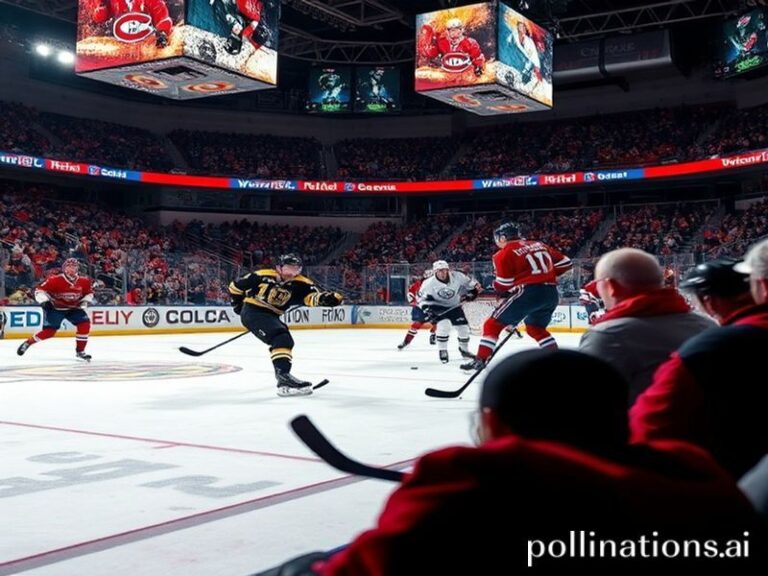Gridiron Globetrotters: How America’s College Football Rankings Became the World’s Favorite Arbitrary Hierarchy
From the Shard to the Sahara—everywhere the Wi-Fi reaches—strangers ask the same question: “Who’s No. 1 in college football?” It is, on the surface, a charmingly parochial query, like asking a Mongolian yak herder about the pecking order of East Anglian lawn-bowls clubs. Yet the answer is parsed in trading rooms from Frankfurt to Singapore, where algorithmic spreadsheets treat the weekly AP poll like an OPEC quota. One unexpected upset in Alabama and the Thai baht wobbles—because the global sports-gambling hydra needs its weekly sacrificial lamb, and nothing bleeds like an overrated linebacker.
If you squint, the College Football Playoff rankings resemble a miniature United Nations—except the Security Council is composed entirely of the SEC, and everyone else speaks only during the cocktail hour. The Big Ten plays the role of the European Union: large, self-important, and forever threatening to form its own breakaway federation. Notre Dame, meanwhile, is Switzerland: neutral on paper, smug in practice, and mysteriously rich. The Group of Five conferences? Think of them as the developing world—occasionally allowed to sit at the table, mostly to provide photogenic underdog footage for the highlight reels.
Overseas, the spectacle is beamed in at ungodly hours. In Seoul, bleary-eyed financiers watch Ohio State throttle hapless Rutgers and quietly price concussion futures. In Lagos, street vendors stream games on cracked phones, overlaying play-by-play with pidgin commentary that makes more sense than the official broadcast. Somewhere above the Arctic Circle, Norwegian grad students use the polls as a case study in “constructed hierarchies,” which is academic speak for “rich kids making arbitrary lists to feel powerful.”
The rankings themselves are a miracle of modern bureaucracy—equal parts analytics and astrology. A 12-person committee meets in a Texas hotel, fortified by bottomless brisket and the unspoken knowledge that whatever they decide will be denounced as fraudulent within six hours. They lean on “game control,” “strength of record,” and other euphemisms for “we like the brand.” It’s FIFA without the bribes—well, with fewer bribes—and it exports American soft power more effectively than any diplomatic cable. When a freshman quarterback leapfrogs a Heisman hopeful in the polls, foreign ministries update their risk assessments: markets like winners, and winners wear Nike.
The collateral damage is global. Bookmakers in Manila set lines on the Iron Bowl; cryptocurrency miners in Siberia pause their rigs to watch Oregon’s playoff hopes evaporate in real time. In the cafés of Beirut, patrons debate whether the Pac-12’s collapse heralds the twilight of the American empire, right after they finish arguing about local electricity cuts. Even the Taliban, bless their ascetic hearts, reportedly follow SEC recruiting on burner Twitter accounts—proof that the human thirst for tribal pageantry transcends ideology.
And yet, for all the pomp, the rankings remain gloriously pointless—an exercise in ranking apples against armored personnel carriers. Last year Cincinnati crashed the playoff only to discover the semifinal was scheduled opposite the Australian Open, thereby teaching the world a valuable lesson: novelty only lasts until Roger Federer walks onto a court. This year TCU threatens to repeat the stunt, and oddsmakers in Macau have opened a side market on how quickly ESPN will cut to LeBron’s tweets once the Horned Frogs trail by three scores.
Still, we watch. Because beneath the analytics and the ad buys, the rankings scratch an itch older than the nation-state: the need to impose order on chaos, to declare who’s king of the castle even as the castle sinks into rising seas. In that sense, the College Football Playoff is the perfect American allegory—loud, lucrative, and forever arguing about who belongs at the top while the foundation quietly erodes. The rest of the planet tunes in not for the sport, which remains impenetrable to anyone raised on actual football, but for the spectacle of a superpower sorting its jocks into ever-shifting tiers of prestige. It’s democracy by other means, with tailgates.
So when the final poll drops and half the Deep South threatens secession, remember: somewhere in a Nairobi cyber-café, a teenager is live-tweeting the outrage in four languages, and a Swiss bank is adjusting its exposure to whichever apparel giant just lost the national championship. The world keeps spinning, unevenly and on no sleep, powered by unpaid athletes and overpaid pundits. And next Tuesday the committee will meet again, armed with fresh brisket and the eternal conviction that this time they’ll get it right—right up until they don’t.







